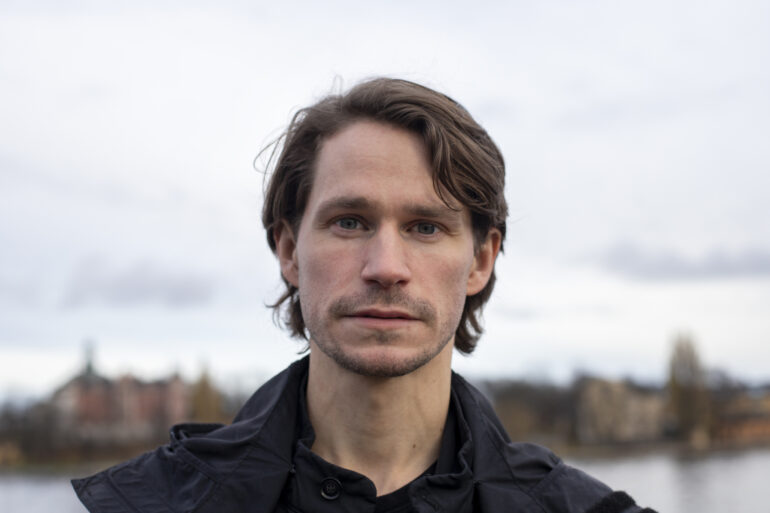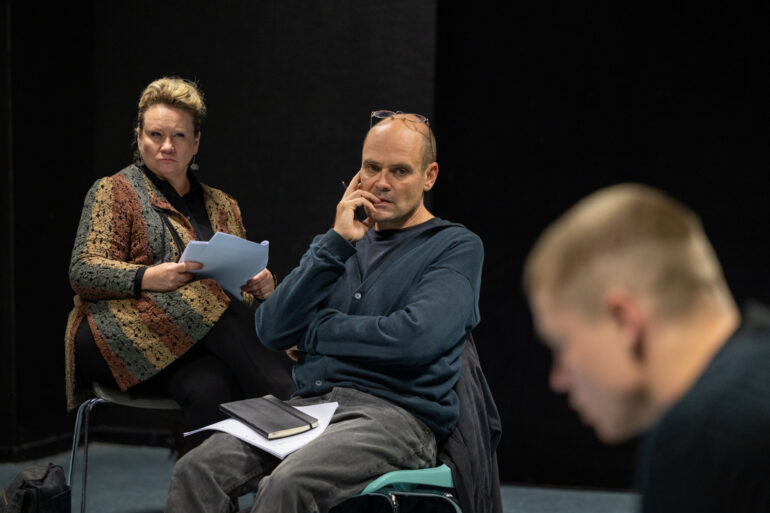Written by: Lina Nystrand
20.01.25
Pelle Rådström’s dream project Pressure Point came to him by a coincidence. He reflects on how ambivalence can shape a powerful narrative, and on the ethical dilemmas of turning reality into fiction.
Swedish writer Pelle Rådström is nominated for Nordic Series Script Award 2025 for the 3-episode drama series Pressure Point (Smärtpunkten).
Pressure Point is about Lars Norén’s daring play "7:3" from 1999, in which three long-convicted criminals perform on stage. The project was meant to be a rehabilitation process, but ended in brutal and deadly robberies.
Pressure Point premiered on SVT 19 April 2024. Main writer Pelle Rådström wrote the series in collaboration with Wilhelm Behrman and Niklas Rockström. It is directed by Sanna Lenken and produced by Kärnfilm and Art & Bob.
What motivated you to write a drama series based on Elisabeth Åsbrink’s factual book on Lars Norén’s prison project?
I’ve dreamed of doing something about Norén and ”7:3” ever since I read Elisabeth’s masterful book almost fifteen years ago, but it wasn’t until three or four years ago that I, as a writer, felt ready to take on the story. The reason I’ve carried the idea of doing something about ”7:3*”* with me for so long is that the story contains so many of the elements I look for in a TV series: an engaging drive in the protagonist, social relevance, hidden agendas, and a suspense creating a threat of violence/danger. Moreover, the story fills me with ambivalence — I, for example, feel a strong sympathy for the belief in humanity that existed within a lot of people in the correctional service. At the same time, the very same people make such shockingly naive decisions for the same reason I sympathise with them. That ambivalence is always, I think, a good starting point when a writer is approaching a story. After all, there are so many absolutely certain opinions being championed in today’s media, while it’s in a way the privilege of a screenwriter to not really feel sure of where you stand, even after you’ve done 3 hours of TV drama on the subject…
How did you come to work with Wilhelm Behrman and Niklas Rockström, and how did you collaborate around the series?
It’s a bit of a strange story how I became part of this project. As I mentioned, I’ve had the story of ”7:3*”* as a dream project for many years. When I finally felt ready to take it on, I contacted Wille Behrman to pitch the project as something he, Niklas Rockström, and I could write together. Wille listened to my pitch with a crooked smile, and then said that he and Niklas had already written a storyline about ”7:3*”*, but that they wouldn’t be able to continue the work. He asked if I’d be interested in taking over the project as the head writer… Such a strange coincidence!
Anyhow, I absolutely adore Niklas and Wille’s TV series Caliphate (Kalifat), and I consider them to be among the absolute best Scandinavian screenwriters. The fact that they trusted me to take over the work they had started is one of the greatest validations I’ve ever received as a writer.
A lot of today’s Nordic films and drama series are based on real events or persons — do you have any thoughts on why this is the case?
I think this is a part of a larger ongoing movement in our culture – a preoccupation with authenticity, reality, and truth. This includes both autofiction in literature and "based on a true story" in film and TV drama. The reasons for this, and how it connects to the fact that we live in a time where our collective understanding of the world is fragmented and challenged by social media, "alternative facts," Trumpism, etc., are questions that more sophisticated people than I should answer.
Instead I’ll offer a more practical answer that relates to the current conditions within the TV and film industry. The streaming era we live in has led to an enormous overproduction of content, and the competition for attention for a film or TV series is fiercer than ever before. So, relying on something the audience is already familiar with — whether it’s a popular book, a well-known IP, or a famous event from real life — is simply a successful way to cut through the noise.
What dilemmas did you face when creating characters based on well-known people who are still alive or have recently passed away?
I think it's extremely important to take the ethical issues that arise when turning reality into fiction seriously — especially when working with a medium like TV drama or film, which has such a wide reach. The risk when you adjust reality to fit the point you are trying to make as a writer, or the dramatic structure you’re working with, is that you might change the collective perception of what really happened. Your dramatic choices and the fictional elements you add could end up replacing the truth.
Moreover, I think it’s unimaginative of a screenwriter to go too far in forcing reality into your fictional dramatic framework. Instead, if you try to go where that reality takes you, and allow reality to be as messy, illogical and strange as it almost always is, your series or film will have a much better chance of being something unique than if you try too hard to squeeze reality into a template you’ve found in a dramaturgy handbook.
Did director Sanna Lenken participate in the script development process, and did you participate in the casting and final edit?
Sanna came in towards the end of the script process – when the focus of the writing shifts from securing the series’ financing to making the script ready for production. Sanna is a very insightful reader, with a great eye for character-defining details and ways to make sequences more effective when necessary.
I often hear stories from other screenwriters about how they have to elbow their way into the processes that follow a finished script, just to have any sense of what’s going on in the production. That’s never the case with Sanna – on the contrary, she always asks for your opinion on casting, editing, and so on. She’s always inclusive, rather than self-sufficient. Dialogical, rather than monological. Caring, rather than exploitative. In short: the opposite of all the stupid notions of how great filmmaking requires a non-listening despot at the helm.
Looking back: Why did you become a scriptwriter? Have your storytelling dreams come true, and how?
As long as I can remember, I’ve had a very passionate relationship with books and films. At some point during my teenage years, I also started secretly writing my own poems and short stories. Writing these texts was both incredibly joyful and, as the ”author nepo-baby" I happen to be, felt quite shameful. In order to continue enjoying the creative process, but avoid some of the shame, I decided to give up writing and instead try my luck with film directing. The problem was that where I wanted to be recognised for my directing talent, the film people I met instead saw screenwriting talent. For example, when I attended a preparatory film school, one of my teachers wanted to collaborate with me after graduation, but the proposed role for me in his project was as a screenwriter. A year later I contacted a production company I thought was doing great work, and offered my services as a directing assistant, but instead, I was hired as a full-time screenwriter and dramaturge. So, in a way, screenwriting chose me more than I chose it. Now, after having worked as a screenwriter for almost ten years, I feel very satisfied that screenwriting chose me.
Official trailer:

